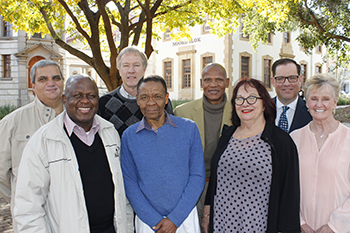Latest News Archive
Please select Category, Year, and then Month to display items
02 January 2025
|
Story Gerda-Marie van Rooyen
|
Photo Supplied
 Leading the research in South Africa is Prof Linus Franke from the Department of Soil, Crop and Climate Sciences.
Leading the research in South Africa is Prof Linus Franke from the Department of Soil, Crop and Climate Sciences.
Scientists are actively pursuing the successful breeding of diploid hybrid potatoes from inbred lines. This is expected to revolutionise potato breeding as it holds the key to rapid genetic progress. It will introduce new varieties for commercialisation through seed. Currently, existing potato variants have a gene that renders self-pollinated seeds infertile.
Prof Linus Franke, an academic in the Department of Soil, Crop and Climate Sciences at the UFS, is leading the research in South Africa. “This technology allows the production of genetically uniform potato seed that is easy to transport and largely disease-free.” He says this differs from conventional breeding whereby only vegetative propagation is possible due to tetraploid varieties in potatoes. It also risks carrying pests and diseases from one generation to the next – leading to the accumulation of pests and diseases with each round of multiplication.
Seed innovation
Prof Franke explains that Solynta BV, a seed company based in the Netherlands that produces potato varieties that can be grown from seed, has included South Africa in their research efforts because it is one of Africa’s largest producers and exporters. Through his academic relationship with Wageningen University and Research, a Dutch institution renowned for its agricultural endeavours and food production, the UFS became involved in researching hybrid potatoes grown from seed.
Diploid seeds containing two sets of chromosomes allow easier gene manipulation to increase predictability and speedier genetic progress. The breeding approach enables the incorporation of tolerance to pests, diseases, abiotic stresses (cold, heat, drought) and other desired genetic traits.
Although Prof Franke is optimistic about this research, he is not blind to disadvantages. “Potato seeds are tiny and have little energy reserves, making it harder to grow potatoes from seed than from tubers.” He says potatoes from seed will take longer to cultivate than tubers, as farmers need to grow plantlets from seeds first, adding six weeks to the growing period. “It is possible that commercial farmers can grow potatoes directly from seed. Alternatively, perhaps more likely, specialised growers will produce tubers of potatoes from seed; these tubers are then sold as seed tubers to other potato farmers, who then continue their normal practices of producing potatoes for the market from tubers.”
Financial benefits
Prof Franke says farmers have reason to get excited. “Seed potatoes will reduce input costs, as varieties with enhanced tolerance to pests and diseases require less pesticides. Planting one hectare of potatoes requires three to four tonnes of potato tubers, but only one 25 g packet of potato seeds.” Since potatoes are a more valuable commodity than maize, this technology might also increase farmers’ income potential.
South Campus first in SA to introduce new online platform for educators
2016-05-25

Dr Whitty Green (DHET), Phillip Dikgomo (NDBE), Ernst Stals (Free State Department of Education), Isaac Mogotsi (Nothern Cape Department of Education), Tsatsi Montso (Free State Department of Education), Prof Daniella Coetzee (Principal: South Campus), Steven Bailey (Academic Partnerships), and Prof Judy Zimny (Academic Partnerships)
Photo: Eugene Seegers |
The South Campus of the University of the Free State (UFS) has become the first in South Africa to introduce a completely online platform for educators to obtain the Advanced Certificate in Teaching (ACT) in either Foundation, Intermediate, or Senior Phase.
Beginning with the first start date of 4 July 2016, this platform will be offered in nine or ten 8-week sessions. It will provide educators the opportunity to complete these certificates in 18-20 months compared to the 24 months usually required by part-time university students. Academic and technological support will also be provided.
Unique platform
Prof Daniella Coetzee, Principal of South Campus, said that she is thrilled, “as this opportunity for educators to earn a qualification 100% online - is a first for both the UFS and South Africa.” This opportunity represents tremendous strides in providing options for South African educators.
According to Prof Jonathan Jansen, Vice-Chancellor and Rector of the UFS, human connectivity is a key component of education: “We should never reduce education to a stranger at a distance without any human interaction. That is also why the UFS has been consistent in promoting not only its Academic Project, but the Human Project as well.” He said that it would not be possible to extend second-chance opportunities to students without partnerships with government, non-profit organisations, local and international academic partners, and other external stakeholders.
Specific challenges addressed
In her presentation, Prof Judy Zimny, who is affiliated with Academic Partnerships (a company that has supported more than 40 universities in providing high-quality online programmes for educators) aligned a number of the challenges described by South African leaders in supporting educators with opportunities now available through online education as a result of recent strides in learning technologies.
Various members of the national education sector were also present at the workshop to give their input: Isaac Mogotsi (Northern Cape Department of Education), Phillip Dikgomo (National Department of Basic Education - NDBE), Dr Whitty Green (Department of Higher Education and Training - DHET), Tsatsi Montso (Free State Department of Education), and Ernst Stals (Free State Department of Education).
For educators interested in pursuing an Advanced Teaching Certificate (ACT), the website will soon be populated with all admission and enrolment information for programmes starting on 4 July 2016, 29 August 2016, and 24 October 2016.